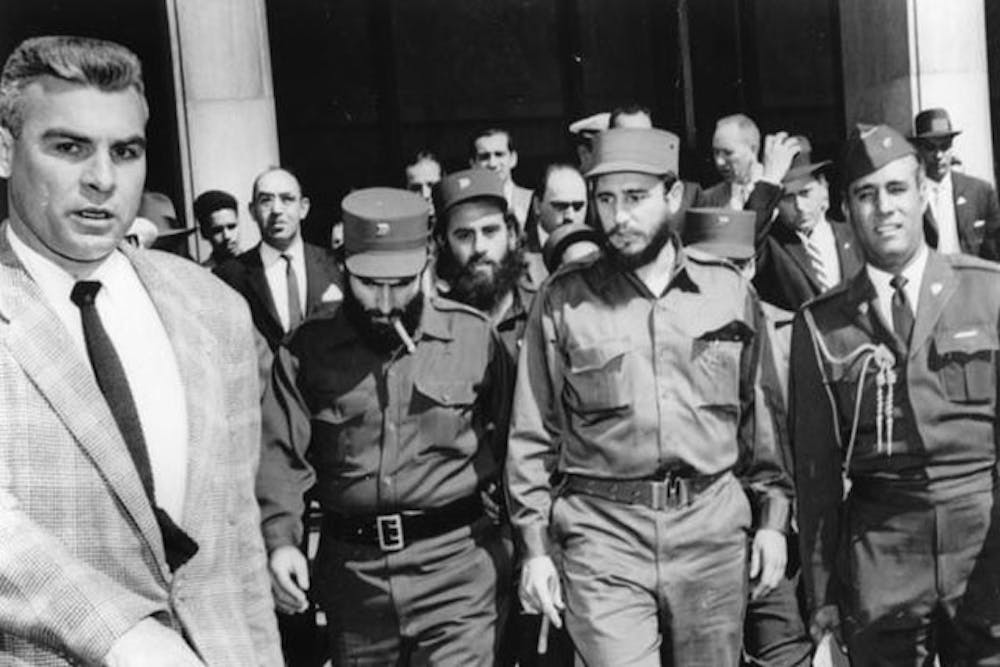Fourth of July. Known for most as the day when the barbecue is up and running, and children are playing with fireworks, but for my family, the Fourth of July is about something much more. It’s about freedom. It was about survival.
My dad grew up in communist Cuba under Fidel Castro. During the Cuban Revolution of 1953–1959, the Cuban people thought Castro would bring about positive change for society and free and fair elections. But the opposite quickly became true. I notice parallels between Cubans choosing Castro and Americans choosing a demagogue who promised them a better life but has instead enacted an authoritarian takeover of institutions.
Every so often, my dad would detail what his life was like under a communist (and frankly autocratic) regime. He would tell me about his so-called “field trips” to the farm where he and his classmates would be forced to pick fruit and vegetables to supply the country. Basic freedoms were practically nonexistent in Cuba. My dad was wrongfully expelled from his university for being a U.S. citizen and couldn’t speak out against the government. When I asked my dad about any specific moments he felt the true weight of his freedom of speech being restricted, he responded: “There was no specific moment, because it was everyday life.”
Americans often forget how fragile democracy really is. The Constitution, electoral systems, and checks and balances only have power because everyone agrees they have power. A singular person can easily subvert that. Just as Castro upended daily life in Cuba, Trump is bending American legal and political institutions at his will.
We like to believe that because we have courts, a constitution and elections every few years, we’re somehow immune to collapse — that autocracy is an issue abroad but could never occur right in our backyard. But history — and my family — would argue otherwise. Democratic backsliding doesn’t always come with tanks in the streets or martial law. It most often looks like slow erosion: leaders chipping away at institutions under the guise of “reform,” media being undermined until the truth itself becomes negotiable, voting rights getting tightened just enough so that the right voices get silenced. It’s laughter in Congress as norms break down. We like to believe that “it can’t happen here.”
But now, we are watching it unfold in real time.
Donald Trump didn’t arrive with a coup. He didn’t need to. Instead, he waged a war on norms, on truth, on institutions — all of which were cloaked in the symbols of American democracy. From the beginning, he deployed tactics eerily familiar to those who have lived under authoritarian rule: delegitimizing the press, villainizing political opponents, glorifying unchecked executive power. His repeated uses of the term “fake” for coverage he doesn’t like have sowed public chaos about the concept of fact versus fiction. Trump has tested the limits of executive authority by removing security details for political opponents like the Biden family and avoiding direct orders from federal courts.
My parents have seen this movie before. And they’ve been sounding the alarm long before it became politically fashionable to do so.
The 2020 election — the most secure in American history — was followed by an avalanche of lies and conspiracies, not to mention the violent insurrection on January 6. What should have been a resounding moment of bipartisan condemnation became, instead, a litmus test for loyalty to a man rather than to the Constitution. Strong supporters threatened to hang Mike Pence, who was simply proceeding with the largely ceremonial role of certifying the election, and Trump himself dropped Mike Pence from his political ticket after this. Most who dared to tell the truth — including Republican officials — were threatened or silenced.
This is how democracy dies. Not with dramatic explosions, but with people refusing to say, “enough.” Elected officials should not have more loyalty to a party demagogue than their country and constituents.
Trump now openly suggests that he will use the presidency to punish his enemies, to deploy the military on domestic soil and to fire career civil servants en masse to install loyalists. His rhetoric about immigrants, political dissenters and journalists mirrors that of the regime my family fled from.
And the system? It hasn’t been as resilient as we’d hoped. The Supreme Court’s granting presidential immunity, the onslaught of misinformation… These are not arbitrary actions. They are the groundwork for a future where the illusion of choice replaces real democracy.
Moreover, the Trump administration’s deliberate refusal to follow court orders, whether it be with refusing to allow AP News into the Oval Office or returning deportees who were wrongly deported, are stark warnings of the United States heading down the path of autocracy.
As we witness the U.S. heading down a dangerous road, I think of my dad and the thousands of immigrants who have fled from violence and persecution and have the memory of being part of a repressed society. The Trump administration is disrespecting the American dream: that anyone can flee oppression to find opportunity on American soil.
If it sounds like I’m being dramatic, good. Because this isn’t just about politics. It’s about preserving democracy and fighting for the kind of country we want to be. Democracy isn’t something you just celebrate on the Fourth of July. It’s something you continuously need to fight for because it’s not a right — it’s a privilege.
Alyssa Gonzales is a sophomore majoring in Political Science and International Studies.





